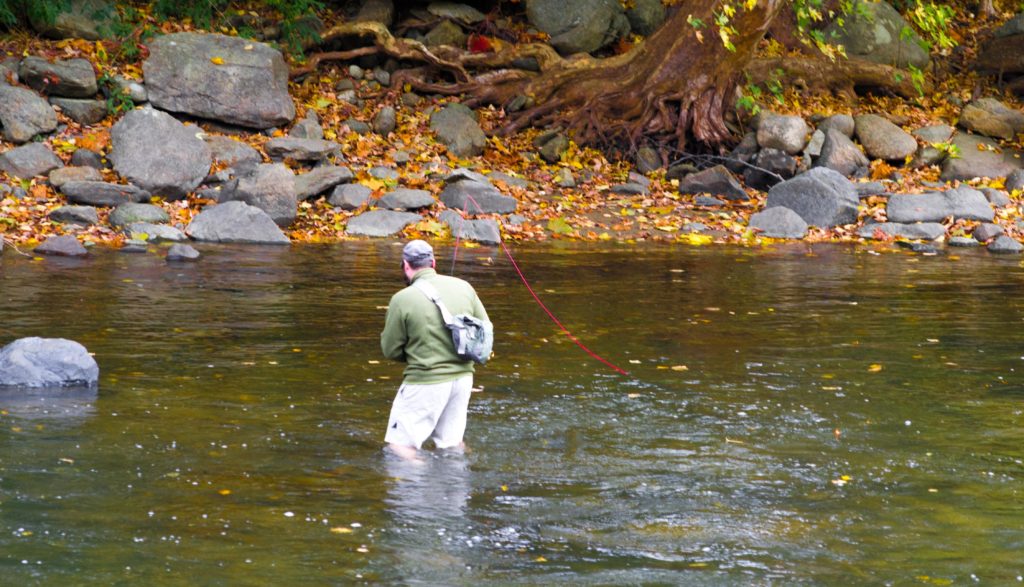Are you a fly-fishing guide? Perhaps you are one of the 6.5 million Americans who enjoy the sport of fly-fishing and depend on a guide. Or perhaps you’ve never even heard of fly-fishing and now we’ve piqued your interest. Today we would like to reach out to our readers who find fly-fishing to be exciting as well as relaxing and those of you who are professional fly-fishing guides who want to learn more about risk management. Remember, fishing on the fly requires reel risk management for both parties—guides and anglers alike.
Wading into some historical fly-fishing angles…
The author Izaak Walton (1593-1683) once referred to fly fishing as “The Contemplative Man’s Recreation.” Many young adults may recall their parents or grandparents reminiscing about fly fishing. Simply put, it is an angling method where the person uses an artificial “fly” to catch fish. Dating back to the end of the 2nd century, this sport can take place in both fresh or salt water. Fly fishermen (and women) use “hand-made” lures that resemble natural invertebrates. The lures entice the fish to bite the fly. You can click here for a quick and easy informative read about the history of fly-fishing or learn about the American Fly Fishing Trade Association (AFFTA) here.
Fly-Fishing guides teach others how to cast their lines…
The American Sportfishing Association considers recreational fishing as an economic powerhouse. They refer to a 2011 U.S. Fish and Wildlife Service National Survey of Fishing, Hunting and Wildlife-Associated Recreation:
“…more than 46 million licensed anglers generate over $48 billion in retail sales with a $115 billion impact on the nation’s economy creating employment for more than 828,000 people. The political clout is even greater when you consider at least 46 million anglers fished at some point over the past five-year period.”
Further evidence of continued growth of this industry was reported by ENSIA on February 13, 2019: “Across Appalachia, Historic Coal Towns Are Looking To The Outdoor Economy For Their Next Act.” Fly-fishing is discussed, as are cities like Asheville, North Carolina, and Chattanooga, Tennessee.
As the industry continues to grow, so does the need for guides to manage their business risks. If you are a regular reader of the John Bailey Company blog, then there is a good chance you read the following posts regarding risk management:
- Risk Management – Is Your Business Connected?, December 18, 2018
- Campgrounds May Be Seasonal – Risk Management Is Not, August 29, 2018
- Resort Risk Management – 5 Tips For Keeping Guests Safe, February 15, 2017
- Fly-Fishing: Prioritizing Client Safety, November 1, 2016
Our John Bailey Company team is proud to work with and provide specialty insurance for Outfitters and Guides. Since 2005, we have specialized in offering comprehensive insurance coverage for entrepreneurs working as outfitters and guides and currently insure outdoor and recreation companies in 20+ states.
Fly Fishing Risk Management Flies Both Directions
Do you like to travel and experience new adventures? It is a simple question for most consumers, but how often have you found yourself in the middle of a grand adventure when things go awry? For example, it could be you live at sea-level and are not aware of how your mild heart condition is affected by higher elevations. Perhaps you are not a good swimmer and a hike in the mountains requires you to cross a creek or shallow river. Understanding your responsibilities as a consumer will assist your guides in planning your trip. Fly Fish Tennessee offers the following tips for you to heed when hiring a guide:
- Tell them what type of fishing you want to do (fly/spin/bait etc.)
- Tell them what type of water (lake, river) and style (boat, wade) you would prefer.
- Be honest and explain your experience level (this is very important and very beneficial that the guide knows ahead of time, because he can tailor the trip around your level, so that you’re not having to make 80 foot casts to cruising rainbow trout if you can’t throw but 30 feet) *Let me stress the honest part!!!!!! every guide I have ever spoken to has horror stories about clients talking up their skills when they really have none, don’t be that person.
- Tell the guide what type of gear you have and ask what you will need or if it is available for use.
- Let the guide know of any physical limitations you might have and if you have any dietary constraints.
- Finally, let them know what you would like to get out of the trip. Are you just wanting to catch a bunch of fish, catch one big fish, learn how to stalk mountain trout or learn how to fish streamers etc. (Most guides are also great teachers.)
To insure a great life and a great fly-fishing experience, consumers should be ‘team players’ by managing their risk.
Fly Fishing is now part of our “Social Community Project”
In late December 2018 and early January 2019, we introduced our Social Community Project. At the time we wrote that we believe our “social community project” serves to provide valuable information to our present and future clients, both individuals and business owners, and to serve as a way to start the conversation about all things health.
On February 15, 2019, we came across a “must read” article in the Jackson Sun: “‘This helps. It calms’: Fly Fishing program brings peace to disabled veterans.” Today the John Bailey Company would like you to take just a few minutes to meet Darrell Mercer and learn about Project Healing Waters Fly Fishing. And, in closing, enjoy a short video titled “The River Just Knows” produced by Project Healing Waters.
If you are having trouble viewing the video, you can see it here.
Healing on the fly is possible. Contact us to insure a great life.

